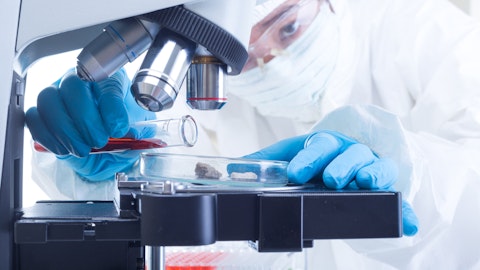That comes down to where oncologists believe the combination has the best opportunity to help their patients and to continue to help their patients survive long term. When you look at it from all those angles, in terms of potential market domination, potential for the patients, it comes down to the triple combination. So that is the decision we have made, is not to move forward with VERSATILE-003, but to add the IL-12 ADC to that combination as the best opportunity and the best combination for the patients and also for market success.
James Molloy : Okay. I think we’ll worry about market domination later. So we’ll get to the trials first. I think VERSATILE-002, the data that came out of that was that the KEYTRUDA with HPV+, HPV16+, head and neck squamous cell, the combination with the KEYTRUDA was best in the CPI-naive, and that’s why VERSATILE-003 was going to go forward in the naive. And the last guidance we had was back in November, October, first patient by year, but obviously that’s done. So 003 is wrapped up, it’s done, it’s not going forward. So, then on the triple combo, 001 plus the commercial checkpoint inhibitor plus the ADC, the CPI refractory patients, I think the plan had been for that — that was going to be for the CPI refractory, is that trial still going forward?
Dr. Frank Bedu-Addo: Again, so rather than having…
James Molloy : Triple combo with the NIH, head and neck cancer, is that trial not going forward?
Dr. Frank Bedu-Addo: Correct. So now rather than having two separate trials, one with the doublet and one with the triplet, if you recall, the triplet had an investigational immune checkpoint inhibitor, right. So the VERSATILE-002 with the doublet, what we saw was extremely compelling long-term survival data. We had 74% survival at two years. When we looked at the refractory…
James Molloy : CPI-naive, right?
Dr. Frank Bedu-Addo: Pardon?
James Molloy : That was in CPI-naive patients..
Dr. Frank Bedu-Addo: That was in CPI-naïve
James Molloy : Not in the refractory.
Dr. Frank Bedu-Addo: Correct. So when you move to the refractory patients, so this is very important because if you recall, that was some of the data that we’d mentioned over the last couple of earnings calls, that we really needed to get that data in the resistant patients to really understand the impact of the various components, right. And so with that data in the refractory patients with VERSATILE-002, what we found was, again, prolonged survival, but 0% objective responses, right. So the T-cell induction was really leading to prolonged survival of these patients, even though they weren’t seeing prolonged tumor shrinkage. Now, when you compare that with what we found in the triple combination, where we then have the low-dose IL-12 and the higher-dose IL-12, with the low-dose IL-12, we were seeing very strong correlation with what we saw with the doublet, very weak objective responses.
With the higher-dose IL-12, we’re seeing dramatically improved objective responses and also improved survival, right. So when you look at those two together, so that data was very informative for us in really understanding the role of each of those components, and that was also critical and drove that decision to say, we have to provide our patients with the best opportunity. And by adding the IL-12 onto that doublet, which has shown a really good safety profile, right, we saw a really good safety profile with PDS0101 in KEYTRUDA, right. Even better results than even KEYTRUDA monotherapy, which I explained earlier on as to why we believe we’re seeing those very high safeties, and then adding the IL-12 ADC on top of that validated combination, right.
And so that’s how these have come together, how that data has actually led us to this decision. So this is really, very simply put, a data-driven decision that’s led us to this point where we’ve now merged the two trials into one trial.
James Molloy : Okay, fair enough.
Dr. Frank Bedu-Addo: Rather than results from the two trials into one.
James Molloy : Maybe the last question for me then, thank you for clarifying. Last question, is the Phase 2 combo trial, PDS0101ADC plus docetaxel and metastatic cancer – castration-resistant prostate cancer with the NCI, it’s a Phase 2 trial. Is that still ongoing?
Dr. Frank Bedu-Addo: Yes. So we have a number of other trials ongoing at the National Cancer Institute. So, currently as PDS, as a company, we are 100% focused on moving this triple combination into the pivotal trial. However, our collaboration with the NCI is still ongoing, and based upon — today, one of the key — if you look at what we’re looking at there in the prostate cancer, as a MOC1positive cancers, liver cancer, combining PDS01ADC with other standards of care. The strategy there is we understand how Versamune is working. We understand that Versamune is inducing tumor-specific T-cells. We also know that not every cancer has a checkpoint inhibitor as a standard of care. So, what’s now very important for us to understand is how our IL-12 ADC works with other standards of care.
That then allows us to very rapidly progress into pivotal trials with a triple for some of those other cancers for which checkpoint inhibitors may not be the standard of care. So, those trials are ongoing. They’re being done as an IIT. The prostate cancer trial with docetaxel was a Phase 2 trial. The locally advanced prostate cancer trial in combination with radiation therapy is also ongoing. The hepatic infusion pump study in liver cancer is also ongoing, as well as the study in Kaposi Sarcoma. So all those studies are still ongoing under the NCI collaboration while we focus 100% on our triple combination and getting that to the finish line.




